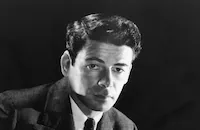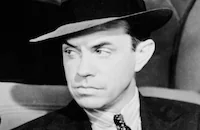The Woman I Love
Cast & Crew
Anatole Litvak
Paul Muni
Miriam Hopkins
Louis Hayward
Colin Clive
Minor Watson
Film Details
Technical Specs

Synopsis
In Oct 1917, Lieutenant Jean Herbillion meets Denise LaValle at an operetta in Paris and, taken with her beauty, insists that they dine together at a cafe. Although he spends only a short time with Denise, Jean, who is about to leave for the French front, falls in love with her and vows to write to her in the country. Shortly after arriving in Jonchery, where he is to serve with the prestigious "Escadrille" flying unit, Jean meets pilot Lieutenant Claude Maury, a former infantryman. Because two of his "observers" died while flying missions with him, Maury has been labelled a jinx by his superstitious fellows and is ostracized by the unit. Jean, however, befriends Maury and, after encouraging him to continue his flying career, listens with respect as he describes his love for his wife Hélène. Soon after, Captain Thelis orders his men to choose a new flying partner with whom they can form équipage . Jean gladly teams up with Maury, and inspired by their natural équipage , through which they "feel alike and think alike," the two men down many German crafts, including a zeppelin. Six months later, Jean heads for Paris on leave, having promised Maury that he will deliver a letter to Hélène in person. As soon as Jean arrives in Paris, he meets with Denise, who while happy to be reunited with him, acts nervous and evasive. When Jean then delivers Maury's letter, he discovers that Hélène and Denise are the same person and, in spite of her protestions of love, is stricken with guilt and anger. Heartbroken, Jean returns to the front but is unable to tell Maury the truth about Denise. Weeks later, Denise, anxious for news about Jean, visits his mother and learns that he has been shipped to Chateâu Neuf in Champagne. There Jean, who has been drinking heavily, snubs Maury and spends his free time with Florence, a local cafe owner. When Denise shows up in Champagne on the eve of the Chateâu-Thierry battle, Jean tries to avoid her, but she eventually finds him in a church. Again Denise tries to convince Jean of the purity of her love, and again Jean rejects her. However, after Maury, who is acting as a temporary captain, receives notice that a volunteer is needed to go to Paris as an instructor, Jean approaches him and Captain Thelis about the assignment. Before signing his transfer, Jean has a change of heart and, on the advice of a knowing Thelis, decides to stay for the fateful battle. Just before their flight, Maury, who has deduced that Jean found out about the Paris assignment from his wife, accuses his partner of romantic betrayal, a charge Jean denies. Although wounded during the heated battle, Jean and Maury rely on their équipage to defeat the enemy. On their way back to the base, Jean pulls a photograph of Denise from his flight jacket and, while dying, tears it in two. Later Maury finds the ripped photograph on the airplane floor but, while being nursed back to health by Denise in Paris, feigns ignorance of her illicit love and remembers his friend with only respect and love.

Director

Anatole Litvak
Cast

Paul Muni

Miriam Hopkins

Louis Hayward

Colin Clive

Minor Watson

Elizabeth Risdon

Paul Guilfoyle
Wally Albright

Mady Christians
Alec Craig

Owen Davis Jr.

Sterling Holloway

Vince Barnett
Adrian Morris

Donald Barry
Joe Twerp
William Stelling
Crew
Ethel Borden
Samuel J. Briskin
Perry Ferguson
Arthur Honegger
Sascha Laurence
Albert Lewis
Walter Plunkett
Van Nest Polglase
Charles Rosher
Henri Rust
Darrell Silvera
Maurice Thiriet
John E. Tribby
Anthony Veiller
Vernon L. Walker
Frank Wead
Roy Webb

Film Details
Technical Specs

Quotes
Trivia
Notes
Although this film was not viewed, the above credits and plot summary were taken from a cutting continuity that was deposited with the copyright records. Onscreen credits refer to an English translation of Kessel's novel, published by Dodd, Mead & Company, but no evidence that a such translation was ever published has been found. The working title of this film was Escadrille. Reviewers commented that the change of title apparently was inspired by King Edward VIII's famous 1936 abdication speech, in which he referred to Wallace Simpson as "the woman I love." According to a January 1937 Hollywood Reporter news item, Republic Pictures considered suing RKO over the use of the title, because they had advertised a claim on it immediately after the abdication speech, but dropped the proceeding when the Copyright Office confirmed RKO's contention that they had acquired the title when they purchased the FBO studios in the late 1920s. Although Anthony Veiller was listed as a co-screenwriter in production charts, he withdrew his credit from the script in March 1937. Frank Wead and Sascha Laurence are credited on December 1936 Screen Achievements Bulletin records as "contributing writers." The exact nature of their contribution is not known. RKO borrowed Paul Muni from Warner Bros., Louis Hayward from Universal and Miriam Hopkins from Samuel Goldwyn's company. Anatole Litvak, who directed the French film on which this picture was based, made his Hollywood directing debut on The Woman I Love. During filming, Miriam Hopkins suffered a dislocated shoulder in an automobile accident with Fred Astaire's wife and was absent from work for several days. According to a Hollywood Reporter news item, scenes for the picture were shot in Point Magu, CA. Hollywood Reporter production charts add the following cast members: Doodles Weaver, Leonid Kinskey, Alan Curtis, William Corson, Dudley Clements, Roland Varno, Art Lewis, Otto Hoffman, Mary McLaren, Maxine Jennings and F. Herrick Herrick. Their participation in the final film has not been confirmed.
According to modern sources, Muni agreed to act in the picture as a favor to producer Albert Lewis. In a modern interview, Lewis states that RKO had wanted Charles Boyer for the role of "Maury" but gave in to Lewis' desire to cast Muni when he was able to negotiate a good "loan-out" deal with Warner Bros. Amelia Earhart visited the set during filming and posed with Muni for a photograph, according to modern sources. Miriam Hopkins, whom Lewis described as a "disturbing element during shooting," married Litvak shortly after this picture was finished. A February 1939 Hollywood Reporter news item notes that when the picture was screened in Rome, students staged a "major riot" because they felt that the film exalted French aviation. Modern sources note that RKO lost $266,000 on the film. In 1927, Maurice Tourneur directed Claire de Lorez and Jean Dax in a Lutèce Films version of Joseph Kessel's novel, which was known in America as The Last Flight. The 1935 French version, which was titled Flight into Darkness in America, starred Annabella, Charles Vanel and Jean-Pierre Aumont. Arthur Honegger wrote the musical score for the 1935 version, as well as collaborating on the 1937 film.












